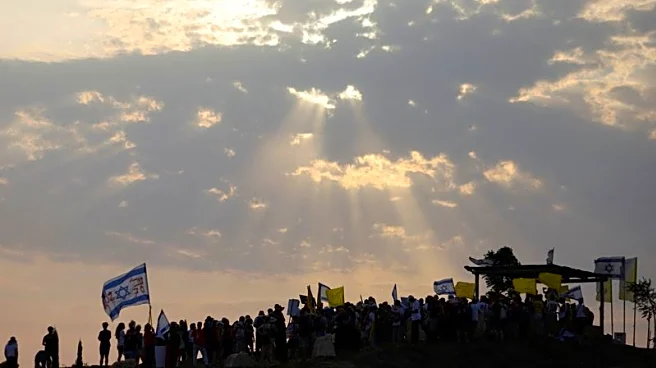By Alexander Cornwell, Maayan Lubell and Nidal al-Mughrabi
TEL AVIV/JERUSALEM/CAIRO (Reuters) -Israel's military called up tens of thousands of reservists on Wednesday in preparation for an expected assault
on Gaza City, as the Israeli government considered a new proposal for a ceasefire after nearly two years of war.
The call-up signals Israel is pressing ahead with its plan to take control of Gaza's biggest urban hub despite international criticism of an operation likely to force the displacement of many more Palestinians.
But a military official briefing reporters said reserve soldiers would not report for duty until September, a move that gives mediators some time to bridge gaps between the Palestinian militant group Hamas and Israel over ceasefire terms.
The official said that as part of planning for a new offensive in Gaza there would be five divisions operating in the enclave but most reservists were not expected to serve in combat in Gaza City.
"We will be moving into a new phase of combat, a gradual, precise and targeted operation in and around Gaza City, which currently serves as Hamas' main military and governing stronghold," the official said.
Israel’s security cabinet, chaired by Prime Minister Benjamin Netanyahu, approved a plan this month to expand the campaign in Gaza, with the aim of seizing Gaza City.
Many of Israel’s closest allies have urged the government to reconsider but Netanyahu is under pressure from some far-right members of his coalition to reject a temporary ceasefire, continue the war and pursue the annexation of Gaza.
The war began on October 7, 2023 when gunmen led by Hamas attacked southern Israeli communities, killing some 1,200 people, mainly civilians, and taking 251 hostages including children into Gaza.
Over 62,000 Palestinians have been killed in Israel's campaign, according to Gaza health officials, who do not say how many were militants but have said most of those killed have been women and children.
Hamas has accepted a proposal put forward by Arab mediators for a 60-day ceasefire that would involve releasing some of the hostages and freeing Palestinian prisoners in Israel.
The Israeli government, which has said all the 50 remaining hostages must be released at once, is studying the proposal. Israeli authorities believe that 20 hostages are still alive.
Many Gazans and foreign leaders fear an assault on Gaza City would cause significant casualties. Israel says it will help civilians leave battle zones before any assault begins.
ISRAEL STRIKES GAZA CITY SUBURBS
Israel's military, which is continuing its campaign in Gaza, struck Gaza City's eastern suburbs overnight in a bombardment which Gaza health authorities said killed at least 19 people.
"This time if there is no deal, I am afraid we will all die," Samir Abu Basel, 45, a father of four, told Reuters by telephone from Gaza. "To die here or die wherever they would push us to, all the same. We have lost faith in this world, in our leaders too."
Israel's military campaign has caused widespread devastation across the Gaza Strip, which before the war was home to about 2.3 million Palestinians. Many buildings, including homes, schools and mosques have been destroyed, while the military has accused Hamas of operating from within civilian infrastructure.
Most Gazans have been displaced multiple times and forced into densely packed areas along the Mediterranean coast, including in Gaza City.
Israeli officials have said evacuation orders would be issued to Gaza City residents before any force move in.
The Latin Patriarchate of Jerusalem, which oversees Gaza's only Catholic Church, located in Gaza City, said it had received reports that neighbourhoods near the small parish had started to receive evacuation notices.
Hamas, which has ruled Gaza for almost two decades, has been severely weakened by the war. The Israeli military says it now controls about 75% of Gaza and that Hamas has been reduced to a guerrilla force.
The Israeli military official who briefed reporters on Wednesday said Hamas had been trying to regroup and reform in Gaza City in a more organised manner, but gave no evidence to support the assertion.
Polls show strong Israeli public support for ending the war if it ensures the release of the hostages, and a rally in Tel Aviv urging the government to pursue such a deal drew a huge crowd on Saturday.
Hamas has said it would release all remaining hostages in exchange for an end to war. Israel says it will not end the war before the Islamist militant group disarms.
(Reporting by Alexander Cornwell in Tel Aviv, Maayan Lubell in Jerusalem and Nidal Al Mughrabi in Cairo; Writing by Alexander Cornwell; Editing by Alison Williams and Timothy Heritage)









